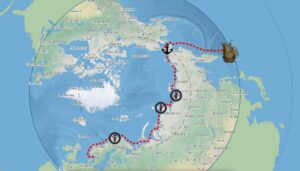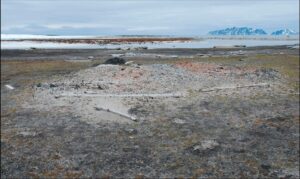What does climbing mean when you’ve lost your country, your culture, and maybe even your family?
In Patagonia’s latest documentary, Afghan women find a renewed sense of strength and hope on the coarse granite of Yosemite National Park.
The film follows a small group of refugees who participated in Ascend, a nonprofit that brought climbing and outdoor sports to women in Afghanistan. Like many nonprofits working there, Ascend’s mission pivoted to evacuation during the disastrous U.S. withdrawal from the country in 2021.
Now, women like Mina Bakshi and Haniya Tavasoli are trying to rebuild their lives in the United States.

Yosemite SAR members Merryn Venugopal and Michelle Pellette decided to partner with Ascend after reading about the nonprofit in ‘Alpinist’ magazine. Photo: Screenshot
Here, the women spend a week in Yosemite National Park. As they climb, laugh, and sing together, Bakshi and Tavasoli find reasons to move forward.
“We can do climbing. We can do sports. We can support each other. We can be leaders,” Tavasoli says in the doc. “With all my hardships, I am here. So it means a lot.”
‘A sobering reminder’
For 20 years, thousands of Afghan women grew up in a country occupied by the United States.
Though they still faced an uphill battle, many young women gained access to education and opportunities long denied by Afghanistan’s patriarchal, fundamentalist society.
Arguments about the merits of America’s 2001 invasion will continue, of course, but one of its undeniable results was to give hope to women across Afghanistan.
At least until August 15, 2021.

Haniya Tavasoli explains why climbing matters to her. Photo: Screenshot
That’s when chaos erupted in the country as President Joe Biden ordered the long-anticipated withdrawal of U.S. military forces. Afghanistan’s political leaders, including its president, fled the country as the Taliban took control. Civilian casualties hit record highs, CNN reported, and a bomb in Kabul airport killed 13 U.S. troops.
The Taliban reinstated the draconian laws that prevented women from doing much except staying home. Almost overnight, Afghanistan’s women saw 20 years of progress crumble.
“All over the country, women report feeling invisible, isolated, suffocated, living in prison-like conditions,” a U.N. report detailed. “It’s a sobering reminder of how swiftly and aggressively women’s and girls’ rights can be taken away.”

Mina Bakshi. Photo: Screenshot
Trying to feel safe
Though Ascend started in 2014, everything changed for the nonprofit during the withdrawal.
“On August 15, we went from being an organization empowering girls in Afghanistan to an organization evacuating and resettling refugees,” said Marina LeGree, the group’s founder.
Many U.S. aid groups suddenly found themselves pivoting to evacuation, including Free To Run, which brought running to Afghan women (and was highlighted in a North Face documentary about its own efforts to evacuate women).
Ultimately, Ascend evacuated 134 people from Afghanistan, helping them resettle in eight different countries.
“I’m trying to feel the safety here,” Bakshi says about her new life in the U.S. “I wanted that safety for everyone in my country.”
When one of the Afghan women reaches the top of a tough route in Yosemite, she begins to sing. As her fellow refugees raise their voices to join her, the group’s hosts try to wipe away their tears while maintaining a safe belay.
Sometimes, all you can do is keep holding on.






